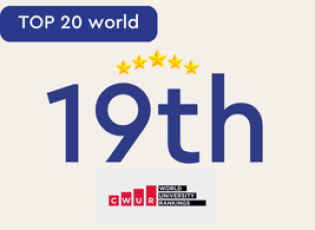PSL in the international rankings
Ranked 2nd in the Young University Ranking (THE), 19th in CWUR, 24th in QS (Quacquarelli Symonds) and 33rd in the Shanghai ranking, ▓Ţ┴˝┬█╠│ is also one of the top 50 universities worldwide in the THE ranking.
▓Ţ┴˝┬█╠│ in the world's top 50


2nd THE Best Young Universities 2024
International university rankings
PSL has been ranked since 2018 in some of the major international university rankings. A few words of explanation on four of them:
- THE ranking: Released by the Times Higher Education (THE), a British monthly newspaper based in London and specialized in the field of higher education, the ranking is based on reputation surveys from academics and/or entrepreneurs. It also includes a several criteria in order to describe the different activities of the universities. Each year, the rankings are released from three different angles: the World University Ranking in September for the coming year, the Reputation Ranking whose results are published in the spring, and the Young University Ranking (YUR), i.e. young universities created less than 50 years ago. All the results for PSL are available on .
- QS World Ranking: Released by Quacquarelli Symonds (QS), a British agency specializing in education, theranking is based on criteria comparable to those of the THE, in particular academic reputation and the quality of research. It also highlights the brand's reputation among employers, the proportion of foreign students and researchers and the faculty-to-student ratio. All the results for PSL can be consulted on the .
- The Shanghai ranking, also known as Academic Ranking of World Universities (ARWU) is one of the indicators that allow, beyond the diversity of national contexts and statutes, to make international comparisons between major research universities, mainly in terms of influence (major international academic prizes) and quality of scientific production (volume and impact measured by citations). The ARWU Global Ranking of Academic Subjects (GRAS), produced with the collaboration of Clarivate, is based, for its bibliometric part, on data from the Web of Science and includes thematic rankings for 54 subjects divided between Natural Sciences (8 subjects), Engineering (22 subjects), Life Sciences (4 subjects), Medical Sciences (6 subjects) and Social Sciences (14 subjects). Some fields such as Arts and Humanities are not covered. 1800 universities are ranked each year out of the 4,000 taken into account. In each subject area, depending on the size of the field, the number of universities ranked can vary between 100 and 500.
Each of those rankings also includes a classification by subject and major scientific fields.
Data collected from the rankings (World University Ranking and Young University Ranking) issued for year 2019 by the Times Higher Education (THE), the British agency Quacquarelli Symonds (QS) and the US News & World Report..



